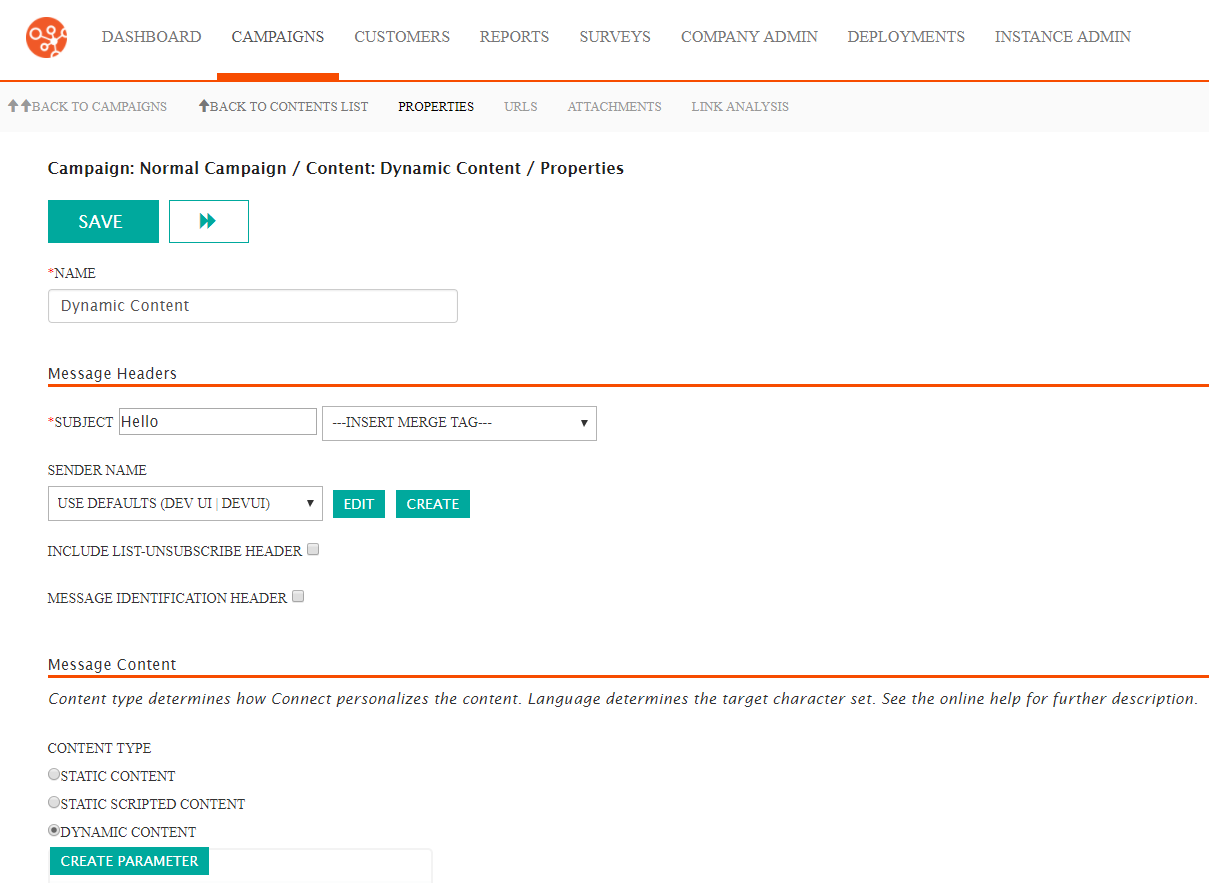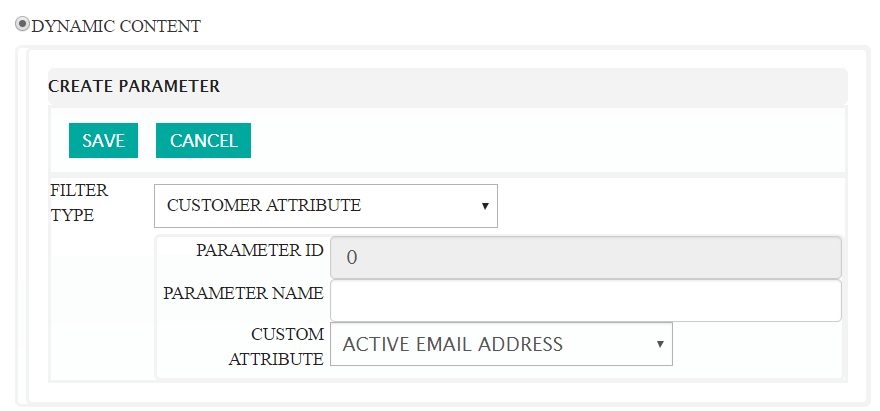Once you have created dynamic or XSL content, you are able to edit the attributes of the content as needed. Parameters used to tailor the content can also be edited, added or removed as necessary.
Editing Dynamic or XSL Content
To edit dynamic or XSL content:
- In the Campaigns list screen, select the appropriate campaign. The campaign's Properties screen appears, displaying the campaign information.
- Click the Content sub-tab for the campaign. The Define Content for
Campaign screen appears.

- Click on the name link of the desired content or click the edit icon (
 ) for
the corresponding content. The Properties screen for the content
appears.
) for
the corresponding content. The Properties screen for the content
appears.
- Edit the following information as necessary (for more information on the
content properties fields, please see Creating Dynamic and XSL Content):
- Name: This is an internal name used to describe the content and is not seen by the customer.
- Subject: The subject line of the message that will be sent to the customer. The customer will read this as the subject line of the message (e.g. "Happy Holidays from MyCompany!")
- --Insert Merge Tag--: Allows you to insert a merge tag to personalize the message's subject line to the customer using customer attributes (e.g. "Happy Holidays, <%[attr:First Name]%>" which would display the customer's first name)
- Sender Name: The sender that will appear in the name and
email address from your organization (e.g. "MyCompany" as the name,
"[email protected]")Note: You are able to create a new sender if the one that you wish to use is not displayed in the Sender Name dropdown. To do so, click the Create button. For more information, see Creating Sender Names.Note: You are able to edit the sender name if the one that you wish to use in the Sender Name dropdown is not configured as you prefer. To do so, click the Edit button. For more information, see Editing Sender Names.
- Include List-Unsubscribe Header: Checkbox that when selected will include the unsubscribe header into the message
- Message Identification Header: Checkbox that when selected will include the message identification header to help identify the campaign in the message
- Content Type: Defines the type of content (Static, Static
Scripted, Dynamic Content or XSL Template). Parameters for the
dynamic content are also displayed here:
- To create a new parameter for the content:
- Click the Create Parameter button. The
Create Parameter section appears.

- Enter the details of the parameter:
- Filter Type: The type of customer attribute or behaviour filter that you wish to use: Customer Attribute, Recency Statistics, Frequency Statistic or Monetary Value Statistics.
- Parameter Name: The name for the attribute
- Attribute: The attribute that will be
used to populate the content specific to the
attribute value for the customerNote: For the four filter types, the attribute values available will change based on the type selected. For more information on the possible values for each filter type, please see dynamic_content_parameters.html#reports_samples
- To cancel the saving of the parameter without saving, click the Cancel button. The Create Parameter section disappears.
- Click the Save button. The parameter is
saved.

- Click the Create Parameter button. The
Create Parameter section appears.
- To edit an existing parameter:
- Click the Parameter Name link of the desired parameter. The parameter details appear.
- Edit the details of the parameter:
- Filter Type: The type of customer attribute or behaviour filter that you wish to use: Customer Attribute, Recency Statistics, Frequency Statistic or Monetary Value Statistics.
- Parameter Name: The name for the attribute
- Attribute: The attribute that will be
used to populate the content specific to the
attribute value for the customerNote: For the four filter types, the attribute values available will change based on the type selected. For more information on the possible values for each filter type, please see dynamic_content_parameters.html#reports_samples
- To cancel the changes to the parameter without saving, click the Cancel button. The Create Parameter section disappears.
- Click the Save button. The parameter changes is saved.
- To delete an existing parameter:
- Click the delete parameter icon (
 ) beside the desired
parameter. Connect displays a warning
message.
) beside the desired
parameter. Connect displays a warning
message.
- To cancel without deleting the parameter, click the Cancel button. The warning message disappears with the parameter not having been deleted.
- Click the OK button. The parameter is deleted.
- Click the delete parameter icon (
- To create a new parameter for the content:
- Language: The language for the content
- Archive Message: A checkbox indicating whether the messages will be archived or not
- Send Using Secure Channel: Determines the security protocol that will be used for the message transmission (No Encryption, Force TLS, Opportunistic TLS)
- Send Mode Override: Determines which sending protocol will be used when sending messages (Default, Use DMS)
- Return to the top of the screen and click the Save button. The content edits are saved.
